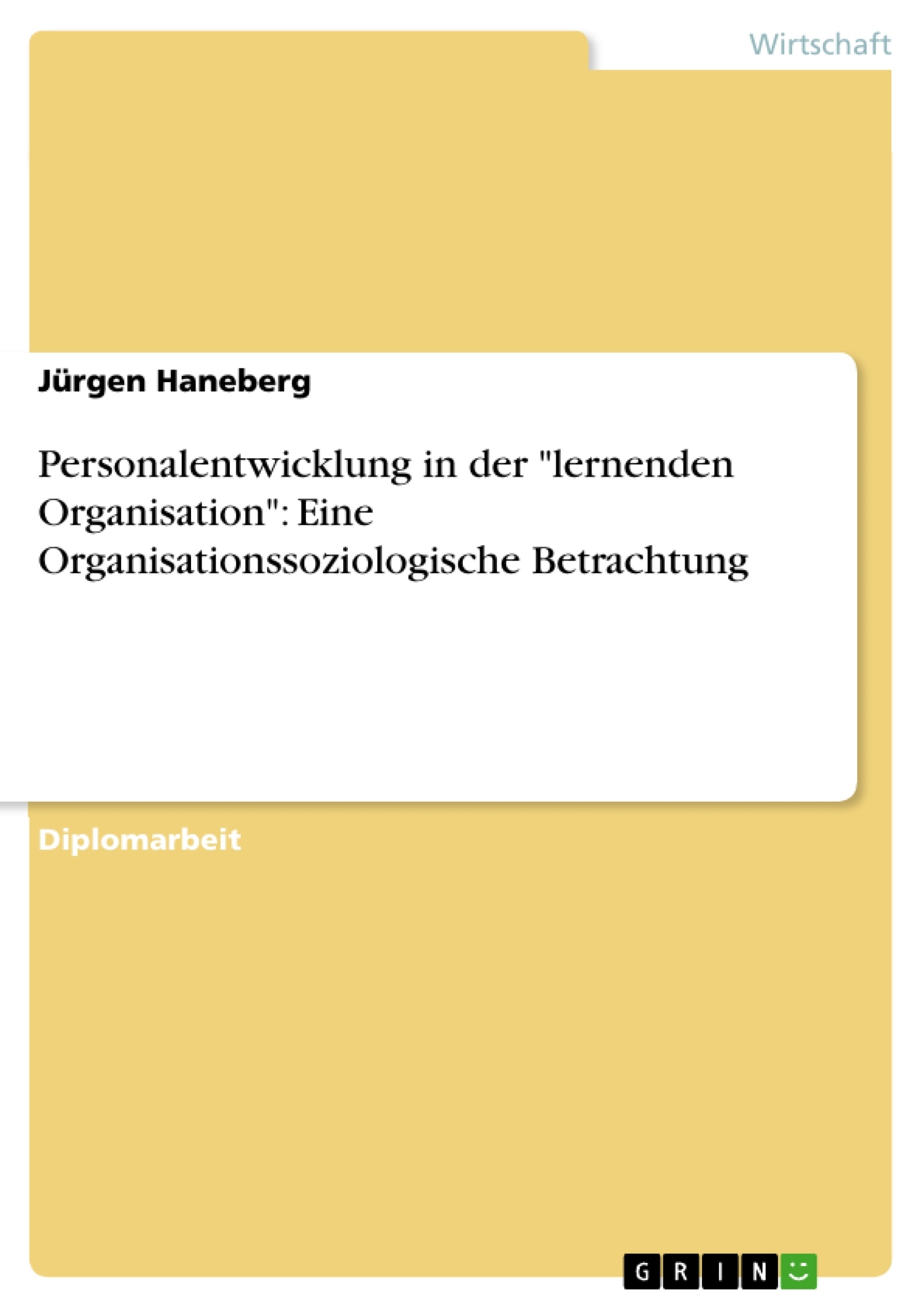Organisationen können lernen. Zu dieser Annahme sind in zunehmender Zahl Organisationstheoretiker wie Managementforscher und Manager gekommen. Deutlich wird dies in der verstärkten Nachfrage nach Konzepten zur Beschreibung und Gestaltung institutionellen Wandels durch organisationales Lernen. Die Annahme, den in der Alltagssprache für Individuen reservierten Lernbegriff analog auf Organisationen anwenden zu können, blickt auf eine mindestens vierzigjährige Debatte in der Organisationstheorie zurück. In den letzten Jahren jedoch - vor allem mit der populärwissenschaftlichen Veröffentlichung von Peter M. Senge (1990) - gewinnt der Begriff in der Managementforschung thematische Hochkonjunktur.
Lernen ist dabei in der Umgangssprache ein positiv besetzter Begriff; das heißt, das Kriterium des Lernerfolgs ist nicht beliebig, nicht wertneutral: zerstörerische Kompetenzen würden damit nicht unter den Lernbegriff subsumiert (Türk 1989, 100). Diese Wertung findet auch Eingang in den Sprachduktus der Managementforscher und Manager. Mitgedacht wird, daß Lernen von Organisationen (ähnlich wie bei Individuen) etwas Wünschenswertes und Nützliches darstellt. Entsprechend wird derzeit in der Managementforschung wie im Management die ‘lernende Organisation’ als anzustrebendes Idealmodell einer Unternehmensorganisation gefordert.
Inhaltsverzeichnis
- PROBLEMSTELLUNG, ZIELSETZUNG UND VORGEHENSWEISE
- ORGANISATIONALES LERNEN
- ORGANISATIONALES LERNEN ALS ‘ADAPTIVE LEARNING’
- Organisationsverständnis: Die Handlungen der Organisationsmitglieder
- Lernen aus Erfahrung: Adaptive Rationalität
- Lernen aus Erfahrung: Die Mehrdeutigkeit der Vergangenheit
- ORGANISATIONALES LERNEN ALS 'SHARING OF ASSUMPTIONS'
- Organisationsverständnis: politisch-soziale und instrumentelle Regelhaftigkeit
- Handlungsbegriff: Theory of Action
- Organisationales Lernen: Die Entwicklung der Organizational Theory-in-use
- ORGANISATIONALES LERNEN ALS 'DEVELOPMENT OF A KNOWLEDGE BASE'
- Organisationsverständnis: Zweckrationales Handeln und organisationale Wissensbasis
- Organisationales Lernen: Die Entwicklung der Wissensbasis
- DISKUSSION: LEISTUNGEN, GRENZEN UND IMPLIKATIONEN ORGANISATIONALEN LERNENS
- Veränderung: Anpassung vs. Lernen
- Lernen: Individuell vs. organisational
- Theoretische (In-)Konsistenzen und praktische Implikationen
- Zweckrationalität, Kausalität und Steuerung
- Organisierte Anarchie, begrenzte Rationalität und Slack
- PERSONALENTWICKLUNG UND ORGANISATIONALES LERNEN
- VERÄNDERUNG DES SELBSTVERSTÄNDNISSES DER PERSONALENTWICKLUNG
- Von der individualisierten Personalentwicklung zur integrierten Personal- und Organisationsentwicklung
- Von der reaktiven zur potentialorientierten Personalentwicklung
- Von der fremdorganisierten zur arbeitsplatznahen, selbstregulierten Personalentwicklung
- KONTEXTFAKTOREN UND GESTALTUNGSVARIABLEN
- Kulturelle und strukturelle Lernkontexte für organisationales Lernen
- Handlungsspielräume und Fehlerfreundlichkeit
- Handlungsspielräume und Slack-Struktur
- Gestaltungsvariablen und Aufgaben der Personalentwicklung
- Partizipation
- Transparenz
- Reflexion
- DIE IMMANENTEN GRENZEN DER FORMALEN VERÄNDERUNGSSTRATEGIE ‘LERNENDE ORGANISATION’
- ZUSAMMENFASSUNG UND KONSEQUENZEN DES ORGANISATIONALEN LERNENS
- ZUSAMMENFASSUNG UND KONSEQUENZEN FÜR DAS THEORETISIEREN ÜBER ORGANISATIONALES LERNEN
- ZUSAMMENFASSUNG UND KONSEQUENZEN FÜR GESTALTUNGSEMPFEHLUNGEN ZUM ORGANISATIONALEN LERNEN
- KONSEQUENZEN FÜR DAS THEORETISIEREN DER SOZIALWISSENSCHAFTEN ÜBER ORGANISATIONALES LERNEN
- LITERATURVERZEICHNIS
- Die Entwicklung des Konzepts des organisationalen Lernens in der Organisationstheorie
- Die verschiedenen Ansätze zum organisationalen Lernen, wie ‘Adaptive Learning’, ‘Sharing of Assumptions’ und ‘Development of a Knowledge Base’
- Die Grenzen und Implikationen des organisationalen Lernens für die Praxis
- Die Rolle der Personalentwicklung in der Gestaltung einer lernenden Organisation
- Die Herausforderungen und Grenzen der formalen Veränderungsstrategie ‘lernende Organisation’
Zielsetzung und Themenschwerpunkte
Diese Diplomarbeit befasst sich mit dem Konzept der ‘lernenden Organisation’ und untersucht die Rolle der Personalentwicklung in diesem Kontext. Die Arbeit verfolgt das Ziel, das Modell des organisationalen Lernens sowohl aus theoretischer als auch aus praxeologischer Perspektive zu analysieren. Dabei werden die immanenten Stimmigkeiten der theoretischen Modelle zum organisationalen Lernen sowie die Rezeptionsfähigkeit der Erkenntnisse in den Gestaltungsansätzen kritisch beleuchtet.
Zusammenfassung der Kapitel
Das zweite Kapitel der Arbeit beleuchtet die verschiedenen Ansätze zum organisationalen Lernen. Es werden die Konzepte ‘Adaptive Learning’, ‘Sharing of Assumptions’ und ‘Development of a Knowledge Base’ vorgestellt und kritisch analysiert. Dabei werden die jeweiligen Organisationsverständnisse, Handlungsbegriffe und Lernprozesse untersucht. Das Kapitel schließt mit einer Diskussion der Leistungen, Grenzen und Implikationen des organisationalen Lernens.
Das dritte Kapitel widmet sich der Rolle der Personalentwicklung im Kontext des organisationalen Lernens. Es wird die Veränderung des Selbstverständnisses der Personalentwicklung von einer individualisierten zu einer integrierten Personal- und Organisationsentwicklung beleuchtet. Weiterhin werden die Kontexte und Gestaltungsvariablen für organisationales Lernen, wie Handlungsspielräume, Fehlerfreundlichkeit und Slack-Struktur, sowie die Aufgaben der Personalentwicklung, wie Partizipation, Transparenz und Reflexion, untersucht. Das Kapitel schließt mit einer Analyse der immanenten Grenzen der formalen Veränderungsstrategie ‘lernende Organisation’.
Schlüsselwörter
Die Schlüsselwörter und Schwerpunktthemen des Textes umfassen organisationales Lernen, lernende Organisation, Personalentwicklung, Organisationsentwicklung, Adaptive Learning, Sharing of Assumptions, Development of a Knowledge Base, Handlungsspielräume, Fehlerfreundlichkeit, Slack-Struktur, Partizipation, Transparenz, Reflexion, Veränderungsmanagement, Managementforschung, Organisationstheorie.
Häufig gestellte Fragen
Was ist eine "lernende Organisation"?
Es ist ein Idealmodell einer Unternehmensorganisation, die fähig ist, kontinuierlich Wissen zu generieren, zu teilen und ihre Strukturen an Veränderungen anzupassen.
Was bedeutet "Adaptive Learning" in Organisationen?
Es beschreibt Lernprozesse als Anpassungsreaktionen auf Erfahrungen und Umweltveränderungen, oft basierend auf begrenzter Rationalität.
Welche Rolle spielt die Personalentwicklung beim organisationalen Lernen?
Sie wandelt sich von einer individualisierten Schulung hin zu einer integrierten Organisationsentwicklung, die selbstreguliertes Lernen am Arbeitsplatz fördert.
Was versteht man unter "Slack" in der Organisationstheorie?
Slack bezeichnet ungenutzte Ressourcen oder Spielräume, die notwendig sind, um Innovationen und Lernprozesse ohne unmittelbaren Leistungsdruck zu ermöglichen.
Warum ist Fehlerfreundlichkeit für lernende Organisationen wichtig?
Ohne eine Kultur, die Fehler als Lernchance begreift, werden Risiken vermieden und notwendige Veränderungen blockiert.
- Quote paper
- Jürgen Haneberg (Author), 1998, Personalentwicklung in der "lernenden Organisation": Eine Organisationssoziologische Betrachtung, Munich, GRIN Verlag, https://www.grin.com/document/185185



